Faculty Reimagine Curriculum
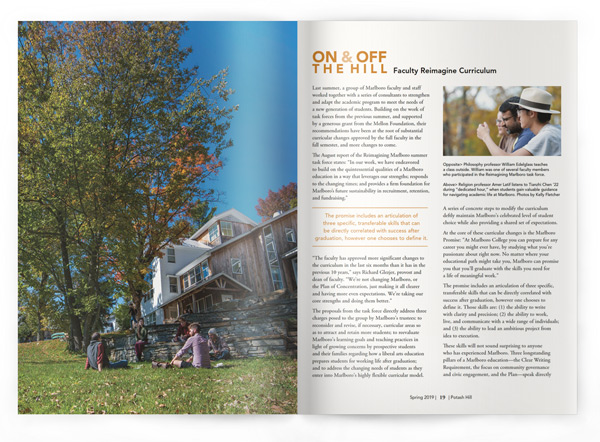
Last summer, a group of Marlboro faculty and staff worked together with a series of consultants to strengthen and adapt the academic program to meet the needs of a new generation of students. Building on the work of task forces from the previous summer, and supported by a generous grant from the Mellon Foundation, their recommendations have been at the root of substantial curricular changes approved by the full faculty in the fall semester, and more changes to come.
The August report of the Reimagining Marlboro summer task force states: “In our work, we have endeavored to build on the quintessential qualities of a Marlboro education in a way that leverages our strengths; responds to the changing times; and provides a firm foundation for Marlboro’s future sustainability in recruitment, retention, and fundraising.”
“The faculty has approved more significant changes to the curriculum in the last six months than it has in the previous 10 years,” says Richard Glezjer, provost and dean of faculty. “We’re not changing Marlboro, or the Plan of Concentration, just making it all clearer and having more even expectations. We’re taking our core strengths and doing them better.”
The proposals from the task force directly address three charges posed to the group by Marlboro’s trustees: to reconsider and revise, if necessary, curricular areas so as to attract and retain more students; to reevaluate Marlboro’s learning goals and teaching practices in light of growing concerns by prospective students and their families regarding how a liberal arts education prepares students for working life after graduation; and to address the changing needs of students as they enter into Marlboro’s highly flexible curricular model. A series of concrete steps to modify the curriculum deftly maintain Marlboro’s celebrated level of student choice while also providing a shared set of expectations.
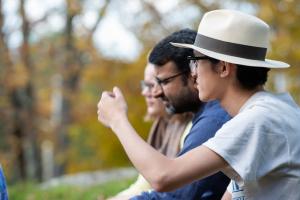
At the core of these curricular changes is the Marlboro Promise: “At Marlboro College you can prepare for any career you might ever have, by studying what you’re passionate about right now. No matter where your educational path might take you, Marlboro can promise you that you’ll graduate with the skills you need for a life of meaningful work.”
The promise includes an articulation of three specific, transferable skills that can be directly correlated with success after graduation, however one chooses to define it. Those skills are: (1) the ability to write with clarity and precision; (2) the ability to work, live, and communicate with a wide range of individuals; and (3) the ability to lead an ambitious project from idea to execution.
These skills will not sound surprising to anyone who has experienced Marlboro. Three longstanding pillars of a Marlboro education—the Clear Writing Requirement, the focus on community governance and civic engagement, and the Plan—speak directly to each of them, respectively. What is new here is a focus on reaching all students with these transformative experiences, and a renewed emphasis on bolstering, documenting, and articulating the skills they support.
“Last summer’s reimagining work created the Marlboro Promise, which is a set of shared curricular goals,” says Kristin Horrigan, professor of dance and gender studies and one of the nine faculty members on the task force. “The faculty’s job for this year is to design and implement the changes that will make the Marlboro Promise a reality for all students. These changes take place in our own classrooms, as well as in the structures that support and guide a student’s four years at Marlboro.”
“The three goals provide us with a much more precise map of the Marlboro territory,” says Meg Mott, professor of politics and another member of the task force. “While we’ve always cohabitated in the land of clear writing, now we dwell in a terrain that includes two other commitments: project management and working with a wide range of individuals.”
Kristin suggests that goal number two, a commitment to teaching all students the skills they need to “live, work, and communicate with a wide range of individuals,” represents the most significant shift in the curriculum. But structural changes that support that commitment are still being drafted by faculty committees and will be debated in the spring, so in a sense the most significant changes are still to come.
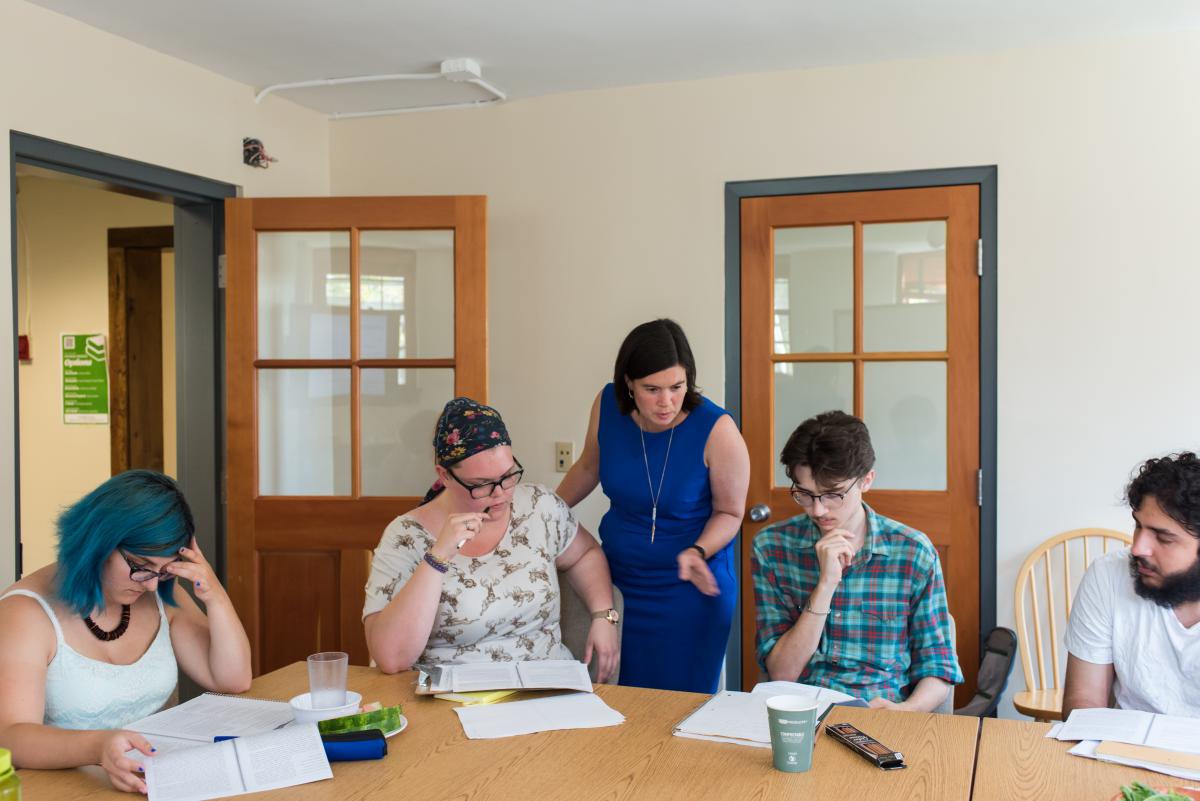
“While students at Marlboro have always had the opportunity to gain these skills by participating in community governance and engaging in community life on a small campus, no one was required to participate,” says Kristin. “Let me be clear that the promise does not mean we are now requiring unwilling students to participate in community governance. Rather we will be providing a range of pathways to allow students to foster these skills, and setting one or more checkpoints where students will need to demonstrate their learning.”
Recent additions to the curriculum that will help support and document the goals of the Marlboro Promise include a new first-year seminar, taken by all first-year students, that provides a clear on-ramp to Marlboro’s unique curricular structure. The seminar serves as an introduction to the four-year “progression,” and clearly articulates the skills students will gain at Marlboro.
Other changes are under consideration by faculty this spring, such as an opportunity for reflection and assessment near the end of each student’s four years, before the completion of their Plan of Concentration. A component of their Plan due during their junior 2 or senior 1 semester would help to support more even progress toward completion and also provide valuable finished work in time for graduate school applications.
“Students who wanted to continue on to graduate school were finding they did not have completed components of their Plan in time to submit them with their applications, so they weren’t applying until the following year,” says Richard. “This early component of the Plan would serve that purpose and also provide a point for reflection on the Plan direction and scope.” More proposed changes to the curriculum would assess students’ process toward the three stated goals at every stage of their progression.
“To me, the most significant shift lies in analyzing the Marlboro curriculum across the full four years with an eye to how we can support students at each point along the way,” says Bronwen Tate, professor of writing and literature and task force member. “This means asking questions like, ‘If we’re thinking of the Plan process as one in which students learn to manage a complex project, are we actually providing our students with explicit opportunities to learn these skills or just hoping that they pick them up along the way?’”
Bronwen continues: “As I tell my writing students, some writing difficulties are necessary and useful, while others—writing in isolation, say, or at the last possible minute—are pointless and avoidable. The reimagining work asks how we can reduce unnecessary confusions and pitfalls so that students have the motivation and joy to face the necessary difficulties of learning and growth. As a writing professor, specifically, I’m excited by the college’s reaffirmed commitment to writing and by the willingness of colleagues across the curriculum to learn together how to be better writing teachers.”
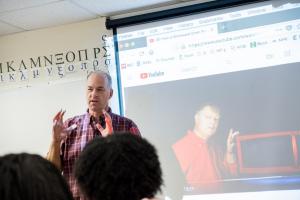
Where the rubber hits the road, so to speak, is of course in the classroom. For many teachers, the Marlboro Promise will mean a substantial shift in how they teach, document, and assess their students, while others consider the changes less dramatic.
“Each of our classes will have to help develop students’ abilities in one or more of these areas—so I have to decide which courses will emphasize which skills,” says Todd Smith, chemistry professor. “I think the biggest change will involve reviewing each of our individual curricula to ensure that it has the structure to support the skill development, while also providing specific content.”
“Instead of using finished essays as the sole means of evaluating mastery of course content, I now offer the option of generating a final presentation for the community that sets out the controversies of the topic through a well-coordinated panel of confident speakers,” says Meg. “The panel operates as a group essay, one that could easily turn into a google doc. Even though writing did not occur, the skills needed to produce a strong piece of writing are given sufficient time.”
“Will it change the way I teach? Not really,” says Adam Franklin-Lyons, professor of history and environmental studies and a member of the task force. Adam expressed some concern that the reimagining made Marlboro look more like other schools, “although Marlboro is and will always remain a unique institution and community.’”
Amer Latif, professor of religion and task force member, says, “The Marlboro Promise allows me to frame the usual duality of instrumentality (transferable skills, making a living, jobs, etc.) and ‘learning as its own end’ in a non-dual manner. I’m very happy with this formulation. I have introduced the promise in all of my classes and am using the framework for situating the activities we do in class. For example, I have institutionalized a formal ‘setting of intention’ at the beginning of each class where students take turns to lead us in creating a space for meaningful conversation. I speak of this activity as training in leadership and reiterate the values and skills associated with the small things we do in class.”
“I think the most significant ‘change’ to the curriculum is not necessarily a change but rather an intentional commitment to the values that the college has always held dear—engaged citizenship, clear communication, and Plan,” says Jaime Tanner, biology professor. “In particular, the articulation of our value for engaged citizenship as part of our curriculum challenges each of us as faculty to evaluate not just what we are teaching but how we ask our students to engage with one another through our courses, how to foster collaboration and encourage dialogue even in the face of disagreement.”
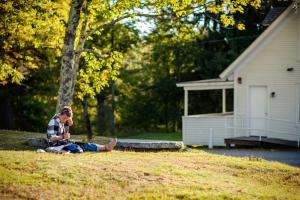
Although it was not originally part of the Reimagining Marlboro process, another important change to the curriculum this year was the adoption of “fields of concentration” to replace the “degree fields” that are attached to Plans. While degree fields were associated with specific learning goals devised by the faculty, the fields of concentration will have goals defined by students specific to their area of research. They will include the degree fields you may be familiar with but can include additional fields subject to approval by faculty.
“The introduction of fields of concentration has been a long time coming, and is more in keeping with Marlboro’s student-driven pedagogy than the rigid degree fields,” says Richard. “The fact that it has been approved in the same breath, almost, as the Marlboro Promise reinforces and confirms the move. In the end, the specific field you choose is not as important as the process and the skills acquired along the way.”
The Reimagining Marlboro effort addresses the longstanding concern that while the Marlboro experience is extraordinary, the college is not delivering that experience evenly to every student. For Marlboro to succeed and thrive, it must be able to make that promise to every Marlboro student—not just those students who become our success stories, buying into our model and stepping up to the challenge of their own initiative. Although still a work in progress, the ongoing reimagining will establish the milestones or “hand-holds” (in the rock-climbing sense, not the crossing-the-street sense) to make that promise a reality, with enormous implications for student recruitment, retention, graduation rates, and alumni engagement.
